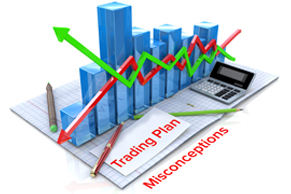Misconceptions of A Trading Plan
Published by Sharekhan Education | May 23, 2022

Misconceptions of A Trading Plan
by Fahim Ansari
About a fortnight ago, in one of the articles, we discussed what is a trading plan and the importance of having it in a trader’s life. In this article, we will discuss some misconceptions about a trading plan.
Whether you are a professional trader or a novice trader, the misconceptions will always creep in. If a trader knows these misconceptions and myths beforehand, he can avoid unnecessary hindrances in Trading.
Some of the misconceptions are listed below
It is boring and time-consuming:
Though a trading plan will take time and effort to complete, it will be a one-time effort to help the trader trade without emotions. Once a trader accomplishes this, it will help them gain greater insight into what kind of a trader they are and concentrate on the type of trader they want to become.
Trading is difficult:
You will see many traders saying this, which seems to be one of the excuses for them to quit Trading. Trading is simple if one follows a rule-based strategy. However, a trader has to go through many phases before being successful. Becoming a successful trader does take a long time; hence, Trading is a marathon and not a Sprint. When he trades, a trader has to fight against himself, his emotions and his psychology, which is a challenge to most traders. Hence to make Trading simple, a trader must tame his feelings and follow a rule-based strategy.
Successful traders don’t have a trading plan:
Unless your name is Benjamin Graham, Warren Buffet, or Rakesh Jhunjhunwala, to name a few, then you need a trading plan. If your name is one of the above, likely, you already have one. A seasoned trader will know this. Before Trading, he will develop a trading plan since Trading without a clear idea of what you want to do, why you want to do that, and how you will do that will almost ruin the probability of being a successful trader.
Copying the plan of a fellow trader will make me successful:
One must understand that different people will have different personalities; also, the circumstances will be other for different people to trade. Trading is different for different individuals; hence it is important to have a trading plan that reflects one’s unique personality and personal circumstances.
e.g., One cannot trade intraday if one cannot be in front of my terminal during the market hours
Trading is gambling:
The difference between Trading and gambling is evident once a trader treats Trading like a business. Gambling is where you have unlimited risk; you take actions without planning. When it comes to Trading, you have a proper risk management plan, take the calculated risk, and take steps by properly analyzing the different scenarios. A successful trader will have a concrete trading plan, while a gambler won’t have any. A gambler loves to make overnight money, whereas a trader would like to make money over a while. Last but not least, a gambler will depend on luck, whereas the trader will trust his strategy.
Trading without Stop-loss:
This is by far the most dangerous misconception that a trader could have. There might have been instances where your stop loss was triggered, and then the price turned in your favor and gave your targets. But then again, one needs to figure out how many times this has happened, and after triggering the stop loss, how many times has the stock created a new low or reached the bottom. One trade like this can cause severe damage and blow off a trader’s account. It can damage the account and also the trader’s mindset. Hence, to be safe, one has to trade with a stop loss since a stop loss determines the amount one is comfortable losing or the worst-case scenario before entering the trade.
Now that the misconceptions are cleared, we at Sharekhan Education heavily emphasise the importance of having and following a sound trading plan. And for a 360-degree understanding of trading and investing, its concepts and its strategies, we highly recommend you go through our extensive courses and pick out the one that best caters to your needs!
By Enrolling yourself in this stock market course, a learner can learn the basics and the various aspects of trading in Futures and Options Trading.




